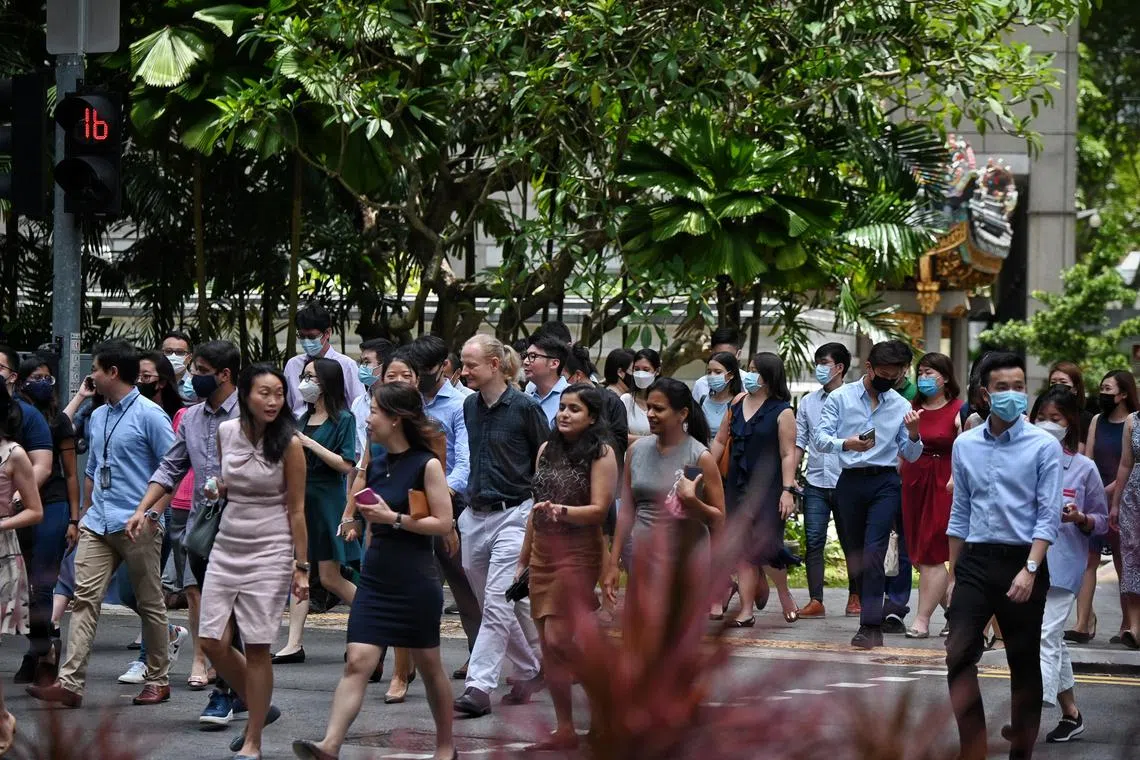Less focus on degrees could ease tech talent crunch: Survey
Sign up now: Get ST's newsletters delivered to your inbox

Singapore has one of the highest digital literacy rates, yet only about 10 per cent claim to have advanced digital skills.
ST PHOTO: KUA CHEE SIONG
SINGAPORE – Most bosses here find it difficult to recruit workers with the right digital skills, but the fault may lie in how they go about the task, noted a new survey.
It found that while hiring managers say they value non-traditional education pathways, many still prefer to see university degrees in resumes.
Only 27 per cent of digital workers in the region say they have a bachelor’s degree, yet 38 per cent of bosses say applicants had better have one – even for an entry-level position.
Ms Florence Yip from recruitment portal Indeed said some hiring managers see a university degree as proof that a job seeker can learn in a structured and disciplined manner.
It is “evidence of a candidate’s dedication, commitment and perseverance, considering that obtaining a degree requires significant investment”, she added.
Around 40 per cent of resident workers in Singapore have degrees, but the survey out on Wednesday shows that 82 per cent of hiring managers complain that getting the desired worker is a challenge, with 42 per cent citing a shortage of qualified applicants.
The online survey by Gallup and Amazon Web Services (AWS) polled 30,000 workers and about 9,000 employers in 19 countries last August, including 1,200 or so workers and about 350 bosses here.
Singapore has one of the highest digital literacy rates in the region, yet only about 10 per cent of workers claim to have advanced digital skills such as cloud architecture, software development, artificial intelligence and machine learning.
Mr Emmanuel Pillai, AWS’ regional head of training and certification, said: “The need for advanced digital skills is still strong, and the skill gap is actually widening, not narrowing.”
Another 30 per cent of workers here have intermediate competencies, such as mastery in drag-and-drop website design, troubleshooting applications and data analysis, and a further 34 per cent know basics such as e-mail, social media, word processing and other office productivity software.
The remaining 26 per cent of respondents said they have no digital abilities.
The resulting talent crunch is forcing a shifting trend, said Mr Sachet Sethi from recruiter Robert Walters Singapore.
“Looking at the current climate, recruiters do share profiles with clients based on experience rather than degrees.
“The market is shifting to hiring talent more on potential rather than just education credentials.”
Apprenticeships, for instance, have also changed the game.
Another factor behind the shortage is rising wages, which are prompting companies to source remote workers overseas.
Human resource platform company Deel lists Singapore as the second-highest regional country by number of organisations hiring internationally.
Companies here are mainly recruiting virtual assistants, software developers, content writers and posts in business development and sales, it said.
Ms Aarti Budhrani of Michael Page Singapore said the reopening of borders has accelerated the trend, and companies are moving towards contract workers, considering candidates from Malaysia, the Philippines, Thailand, Indonesia and Vietnam.
“Singapore is still way ahead” when it comes to talent quality, she said.
But requisite qualifications will constantly change, she added. “Let’s say, previously, the need was for a Java developer. Now they want a Java developer on a cloud platform.”
There are just not enough workers to feed the sector, which employed around 142,000 workers as at last September. There were just over 1,800 information technology students graduating from local universities in 2021.
Like many tech companies building their own pipeline of talent, AWS has launched a new free course across the region that aims to place unemployed or even gig workers with IT experience – such as in basic coding – in cloud-related jobs.
Mr Sethi said: “One out of three roles in tech still requires cloud-computing knowledge and skills. This is a sector that will only continue to grow.”
Ms Yip noted that job postings for cloud engineers have risen 62 per cent on the Indeed portal since January 2020.
The survey found that across the region, digital skills could be life-transforming: Even workers who use basic e-mail or word processing software make 39 per cent more than their non-digital peers.
In Singapore, digitally advanced workers such as cloud engineers and software engineers make over $83,000 more annually than their non-digital peers.
They are happier at work too: 54 per cent of such workers scored their jobs highly, compared with 40 per cent with intermediate digital skills and 39 per cent with basic capabilities.
Employers told Gallup that 5G, AI and robotics are the three technologies most likely to become permanent features of their operations.
Ms Purva Hassomal, Gallup’s head of learning and development for the Asia-Pacific, said: “The word is continuous learning, because as one technology sunsets, another will rise.”
Ms Yip said that for those planning to get into the industry, especially if they are not armed with a degree, a plan is necessary.
Besides certifications, they should explore opportunities to volunteer with non-profit organisations or community groups to gain practical experience in areas such as coding, Web development and data analytics, she said.
Show up at industry events, online communities, meet-ups and workshops, she added. “Networking is also vital.”



